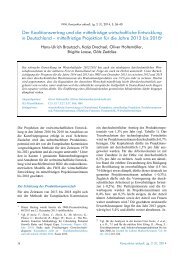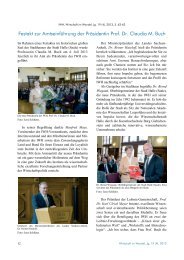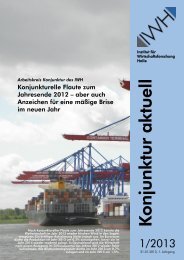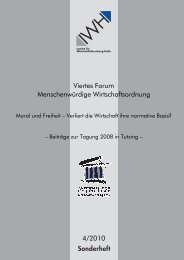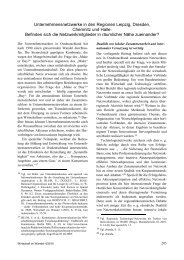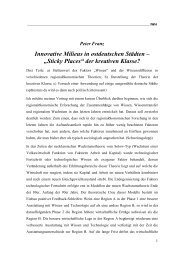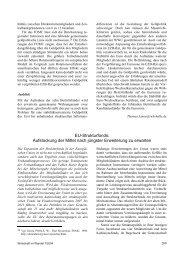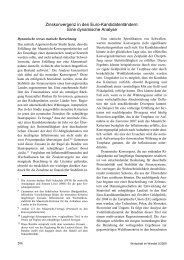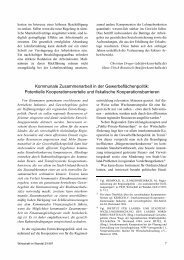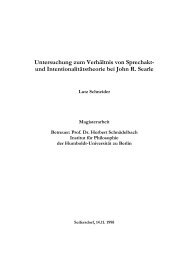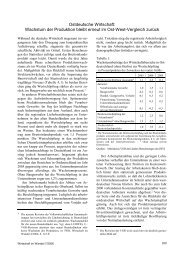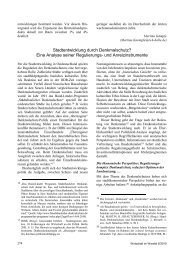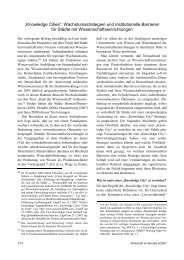Fünftes und sechstes Forum Menschenwürdige Wirtschaftsordnung ...
Fünftes und sechstes Forum Menschenwürdige Wirtschaftsordnung ...
Fünftes und sechstes Forum Menschenwürdige Wirtschaftsordnung ...
Sie wollen auch ein ePaper? Erhöhen Sie die Reichweite Ihrer Titel.
YUMPU macht aus Druck-PDFs automatisch weboptimierte ePaper, die Google liebt.
Akademie für Politische Bildung Tutzing<br />
Hofstede, G. H.; Bond, M. H. (1988): The Confucius Connection: From Cultural Roots<br />
to Economic Growth, in: Organizational Dynamics, Vol. 16 (4), pp. 5-21.<br />
Kahn, H. (1979): World Economic Development: 1979 and Beyond. Westview Press:<br />
Boulder.<br />
Kwon, J. (1994): The East Asian Challenge to Neoclassical Orthodoxy, in: World<br />
Development, Vol. 22 (4), pp. 635-644.<br />
Leipold, H. (2000): Der chinesische Kultur- <strong>und</strong> Wirtschaftsraum als Herausforderung<br />
für die Institutionenökonomik, in: ASIEN, Vol. 76, pp. 29-46.<br />
Levy Jr., M. J. (1992): Confucianism and Modernization, in: Society, Vol. 29 (4),<br />
pp. 15-18.<br />
Lu Xun (ohne Jahr): The Old Tune has Been Sung Enough, so zitiert in: Chow, T.<br />
(1960): The May Fourth Movement. Intellectual Revolution in Modern China.<br />
Harvard University Press: Cambridge, London.<br />
MacFaquhar, R. (1980): The Post-Confucian Challenge, in: The Economist, Vol. 9,<br />
pp. 67-71.<br />
Morishima, M. (1982): Why has Japan Succeeded? Western Technology and the<br />
Japanese Ethos. Cambridge University Press: Cambridge.<br />
Nee, V.; Opper, S. (2010): Endogenous Institutional Change and Dynamic Capitalism.<br />
CSES Working Paper Series, No. 54. Cornell University.<br />
North, D. C. (1990): Institutions, Institutional Change and Economic Performance.<br />
Cambridge University Press: Cambridge.<br />
North, D. C. (2005): Understanding the Process of Institutional Change. Princeton<br />
University Press: Princeton-Oxford.<br />
Pascha, W.; Storz, C. (2005): Wirkung <strong>und</strong> Wandel von Institutionen. Das Beispiel<br />
Ostasien. Lucius & Lucius: Stuttgart.<br />
Pejovich, S. (2003): Understanding the Transaction Costs of Transition: It’s the Culture,<br />
Stupid, in: The Review of Austrian Economics, Vol. 16 (4), pp. 347-361.<br />
Pye, L. W.; Pie, M. W. (1985): Asian Power and Politics: The Cultural Dimension and<br />
Authority. Harvard University Press: Cambridge.<br />
Redding, G. S. (1990): The Spirit of Chinese Capitalism. Walter de Gruyter: Berlin,<br />
New York.<br />
Robinson, J. A.; Wiegandt, K. (2008): Die Ursprünge der modernen Welt. Geschichte<br />
im wissenschaftlichen Vergleich. Fischer: Frankfurt am Main.<br />
Rühle, S.: A Different Capitalism for China? The Role of Guanxi and the Family for<br />
Chinese Economic Development, in: W. Pascha, C. Storz, M. Taube (eds), Institutional<br />
Variety in East Asia. Formal and Informal Patterns of Coordination. Edward<br />
Elgar: Cheltenham (im Druck).<br />
Schleichert, H. (1980): Klassische chinesische Philosophie. Klostermann: Frankfurt am<br />
Main.<br />
109




